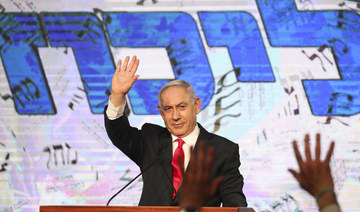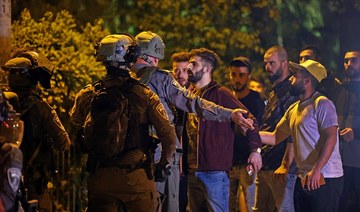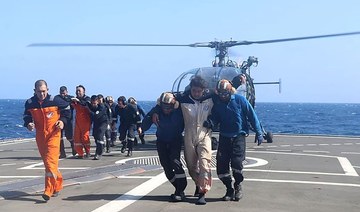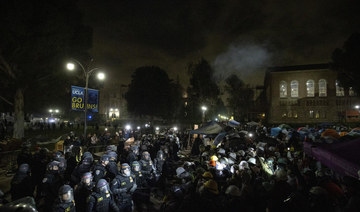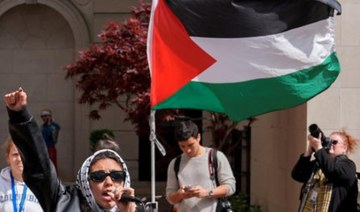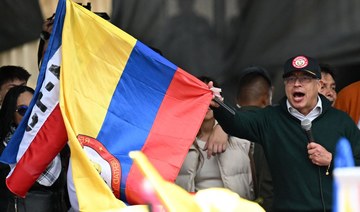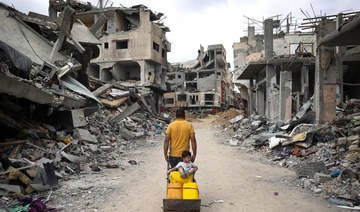LONDON: Israel “firmly rejects” pressure not to build in Jerusalem, Prime Minister Benjamin Netanyahu said on Sunday following spreading international condemnation of planned evictions of Palestinians from homes in the city claimed by Jewish settlers.
“We firmly reject the pressure not to build in Jerusalem. To my regret, this pressure has been increasing of late,” Netanyahu said during a televised address ahead of national commemorations of the Israeli capture of east Jerusalem in a 1967 war.
“I say also to the best of our friends: Jerusalem is Israel’s capital and just as every nation builds in its capital and builds up its capital, we also have the right to build in Jerusalem and to build up Jerusalem. That is what we have done and that is what we will continue to do,” Netanyahu said.
His comments come as Israel’s justice ministry said it would delay the key Monday hearing in the case that could see Palestinian families evicted from their Jerusalem homes to make way for Jewish settlers.
“In all the circumstances and in light of the attorney general’s request, the regular hearing for tomorrow, May 10, 2021 (is) canceled,” it said in a statement, adding it would schedule a new hearing within 30 days.
The delay follows days of clashes between Palestinian protesters and Israeli security forces, fueled in part by the dispute in the Sheikh Jarrah neighborhood.
Meanwhile, UNICEF urged the Israeli authorities to refrain from using violence against children and release all those detained, after 37 Palestinian children have been injured and arrested in east Jerusalem in the last two days.
“Over the past two days, 29 Palestinian children were injured in east Jerusalem, including in the Old City and the Sheikh Jarrah neighborhood (and) eight Palestinian children were arrested.
“A one-year old toddler was among those injured. Some children were taken for treatment at hospitals with injuries in the head and the spine,” the UN children’s body said.
UNICEF said it received reports that ambulances were restricted from arriving on location to assist and evacuate the injured and that an on-site clinic was reportedly hit and searched.
“All children should be protected from violence and kept out of harm’s way at all times. Families’ rights to access all places of worship should be preserved and those injured be assisted without restrictions,” it said in a statement.
Pope Francis expressed his concern at the unrest in Jerusalem, saying: “Violence only generates violence. Let’s stop these clashes.”
“I pray so that this might be a place of encounter and not violent clashes, a place of prayer and of peace. I invite everyone to seek shared resolutions so that the multireligious identity and multiculture of the holy city might be respected and so that fraternity might prevail,” he said after reciting the Regina Caeli prayer.
Jordan also urged Israel on Sunday to stop what it described as “barbaric” attacks on worshippers in Jerusalem’s Al-Aqsa mosque and said it would step up international pressure.
Jordan, which has custodianship of Muslim and Christian sites in Jerusalem, said Israel should respect worshippers and international law safeguarding Arab rights.
King Abdullah II condemned the violations and said he rejected attempts by Israeli authorities to change the demographic situation in east Jerusalem, and all measures aimed at changing the city’s historical and legal status. The king also called on Israel to adhere to international law and international humanitarian law.
During a phone call with Palestinian President Mahmoud Abbas, King Abdullah said Jordan would continue to protect Islamic and Christian holy sites and to preserve its Arab and Islamic identity, and called for coordination between Arab states to put an end to the Israeli violations in east Jerusalem and the Al-Aqsa mosque.
“What the Israeli police and special forces are doing, from violations against the mosque to attacks on worshippers, is barbaric (behavior) that is rejected and condemned,” the government said in a statement.
Jordanian Foreign Minister Ayman Safadi said the kingdom would do its utmost to protect rights of Palestinians against ownership claims by Jewish settlers.
“Israel as the occupying force carries responsibility for protecting rights of Palestinians in their homes,” Safadi said in comments on state media.
Tunisia, the only Arab member of the UN Security Council, in coordination with Palestine, submitted a request to hold a session on Monday to discuss the dangerous escalation and aggressive practices of the Israeli authorities in Palestinian territories.
The request was supported by China — current president of the council — along with Norway, Ireland, Vietnam, Saint Vincent, the Grenadines and Niger.
The session will also discuss Israeli attacks against the Palestinians and their insistence on their expansionist policies, including settlement plans, demolition and dispossession of homes, displacement of Palestinian families, land grabbing, and obliterating the historical and civilizational identity of Jerusalem, the Tunisian foreign ministry said.
“These practices constitute a flagrant violation of international law, a threat to international peace and security and undermine efforts aimed at achieving a just and comprehensive peace in the region,” the ministry added.
Arab League foreign ministers announced they would hold an emergency meeting on Tuesday at Palestine’s request, which has been supported by a number of countries.
Hossam Zaki, assistant secretary-general of the Arab League, said in a statement “the meeting will discuss Israeli crimes and attacks in the occupied city of Jerusalem, Islamic and Christian holy sites, especially Al-Aqsa Mosque, and attacks on worshipers, in addition to the brutal Israeli attacks and plans to seize the homes of Palestinian families in the Sheikh Jarrah neighborhood to empty the city of its residents and displace its people.”
Zaki said the decision was taken to raise the level of the meeting to the ministerial level, instead of ambassadorial, in proportion to the “seriousness of the Israeli attacks that are part of the Zionist regime’s systematic policy to Judaize Jerusalem and change the existing legal and historical status of the city and its sanctities.”
The Arab Parliament also said it will hold an emergency session on May 19 in Cairo to discuss the same issues.
Adel bin Abdulrahman Al-Asoumi, president of the Arab Parliament, stressed the need for Israel to stop the ongoing crimes committed against the Palestinian people, and support all their rights, foremost of which is the establishment of an independent Palestinian state, with east Jerusalem as its capital.
The Organization of Islamic Cooperation is also set to hold an emergency session on Tuesday.
Dozens of Palestinians and several Israeli police officers have been wounded in clashes in recent days in east Jerusalem’s Sheikh Jarrah neighborhood, the scene of a long-running land dispute and located a short walk from flashpoint holy sites.
The case dates back to before the creation of the state of Israel, when a small Jewish community lived in Sheikh Jarrah.
After Israel’s independence and the 1948 war with its Arab neighbors, east Jerusalem came under the control of Jordan.
Many refugees settled in the district after fleeing Zionist forces in other parts of what was now Israel.
Israel then seized east Jerusalem in the 1967 Six Day War and later annexed it.
Early this year, the Jerusalem district court ruled in favor of Jewish settlers who laid claim to land in the Sheikh Jarrah district, now home to around 30 Palestinians from four families.
Palestinians argue that discriminatory laws mean they are unable to claim back their properties inside what is now Israel.
The Palestinian families’ lawyer, Hosni Abu Hussein, also accused the settlers of fraud.
“The registration of the lands in the name of the settlement association took place through fraud and deception, in collusion with the commissioner of public properties and the registrar of Israeli lands,” he told AFP.
The dispute, in a strategic location close to Jerusalem’s Old City, has added fuel to tensions around the nearby Al-Aqsa mosque, Islam’s third-holiest mosque, during the Muslim holy month of Ramadan.
Hamas in Gaza have threatened attacks against Israel if the high-profile case goes against the Palestinian families.
(With Reuters and AFP)
Netanyahu says Israel firm on Jerusalem as global concern mounts
https://arab.news/rjyy3
Netanyahu says Israel firm on Jerusalem as global concern mounts
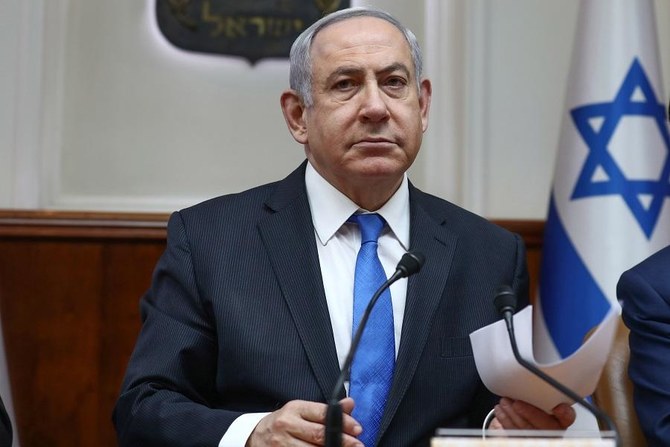
- Pope Francis has also called for an end to the violence in Jerusalem
- Tunisia calls for UN Security Council meeting, as Arab League and Arab Parliament to hold emergency sessions to discuss Israeli crimes and attacks
Houthi leader vows ‘fourth phase’ of Red Sea ship attacks
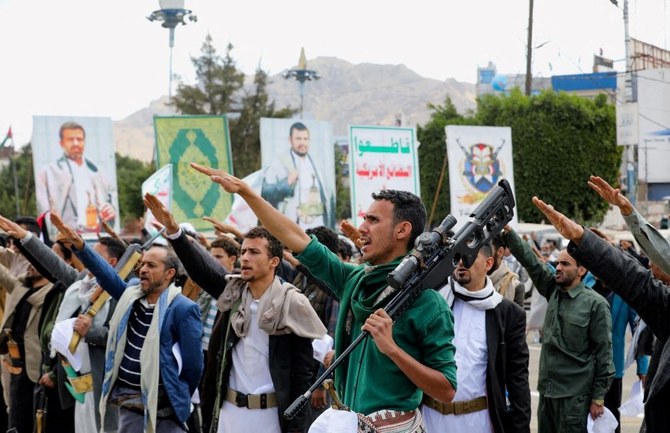
- Abdul Malik Al-Houthi: ‘We are preparing for a fourth round of escalation if the Israeli enemy and the Americans continue their intransigence’
- Al-Houthi said that 452 attacks by US and UK armies on militia-controlled regions had killed 40 people and injured 35 others since January
AL-MUKALLA: The leader of the Houthi militia vowed to escalate attacks on ships in the Red Sea until Israel ends its war in Gaza and the US stops attacking Yemen.
“We are preparing for a fourth round of escalation if the Israeli enemy and the Americans continue their intransigence,” Abdul Malik Al-Houthi said in a televised speech on Thursday.
Al-Houthi said that his forces launched 606 ballistic missiles and drones against 107 Israeli, US, and UK ships in the Red Sea, Bab Al-Mandab Strait, Gulf of Aden, and recently in the Indian Ocean during the Red Sea ship campaign that began in November.
In the last seven days alone, the Houthis have fired 33 ballistic missiles and drones at six ships in international seas off Yemen’s coast, as well as Israel’s city of Eilat.
Al-Houthi said that 452 attacks by US and UK armies on militia-controlled regions had killed 40 people and injured 35 others since January.
His warning came after the militia’s media said on Thursday that the US and UK carried out five airstrikes on Hodeidah airport in the Red Sea’s western city of Hodeidah.
On Tuesday, the US carried out another strike on the port of Al-Saleef in Hodeidah after the US Central Command reported its troops stopped a Houthi assault with a drone boat on the same day.
The Houthis have seized a commercial ship, sunk another, and launched hundreds of missiles and drones at international navy and commercial ships in the Red Sea since November, claiming to be in support of Palestinians and pressuring Israel to cease its war in Gaza.
As a response to the attacks, the US formed a coalition of marine forces to protect the Red Sea.
It also launched strikes on Houthi targets in Sanaa, Saada, Hodeidah, and other Yemeni areas controlled by the Houthis.
Turkiye’s Erdogan criticizes US crackdown on college protests
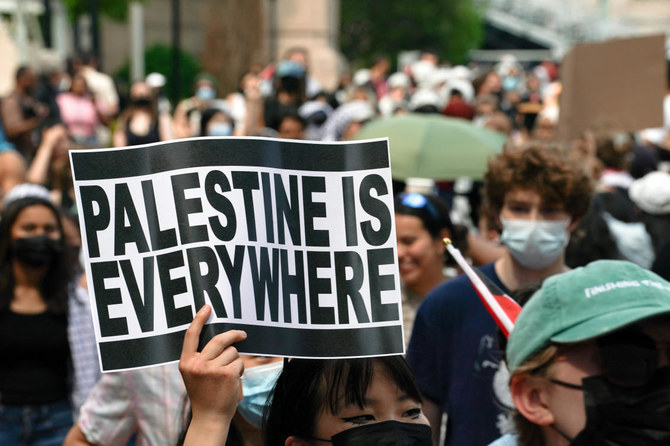
- “Conscientious students and academics including anti-Zionist Jews at some prestigious American universities are protesting the massacre (in Gaza),” Erdogan told an event
- “These people are being subjected to violence, cruelty, suffering, and even torture for saying the massacre has to stop“
ANKARA: Turkish President Tayyip Erdogan waded into the debate over US college campus protests on Thursday, saying authorities were displaying “cruelty” in clamping down on pro-Palestinian students and academics.
Demonstrations have spread on campuses across the United States over Israel’s conduct of the war in Gaza, prompting police crackdowns and arrests at some venues such as Columbia University in New York.
“Conscientious students and academics including anti-Zionist Jews at some prestigious American universities are protesting the massacre (in Gaza),” Erdogan told an event in Ankara.
“These people are being subjected to violence, cruelty, suffering, and even torture for saying the massacre has to stop,” he said, adding that university staff were being “sacked and lynched” for supporting the Palestinians.
Turkiye, a NATO ally of the United States, has sharply criticized Israel’s assault on Gaza and what it calls the unconditional support it receives from Western countries.
The US is a top supplier of military aid to Israel and has shielded the country from critical United Nations votes.
“The limits of Western democracy are drawn by Israel’s interests,” Erdogan said. “Whatever infringes on Israel’s interests is anti-democratic, antisemitic for them.”
More than 34,000 people have been killed in Gaza during Israel’s nearly seven-month military offensive, Palestinian health officials say, after Hamas militants killed some 1,200 people and took 253 hostages during an Oct. 7 assault on southern Israel, according to Israeli tallies.
Israel president says US universities ‘contaminated by hatred, anti-Semitism’

- “We see prominent academic institutions, halls of history, culture, and education contaminated by hatred and anti-Semitism fueled by arrogance and ignorance,” he said
- “We watch in horror as the atrocities of October 7th against Israel are celebrated and justified“
JERUSALEM: Israel’s president on Thursday slammed US universities for campus unrest over Israel’s war in Gaza, saying these institutions were “contaminated by hatred and anti-Semitism.”
Isaac Herzog said in a special broadcast that he was issuing an urgent message of support to Jewish communities amid a “dramatic resurgence in anti-Semitism and following the hostilities and intimidation against Jewish students on campuses across the US in particular.”
“We see prominent academic institutions, halls of history, culture, and education contaminated by hatred and anti-Semitism fueled by arrogance and ignorance,” he said.
“We watch in horror as the atrocities of October 7th against Israel are celebrated and justified.”
His comments came as hundreds of police and protesters were in a tense stand-off at the University of California, Los Angeles and unrest over Israel’s war against Hamas in Gaza continued to spread in campuses across the United States.
Demonstrators have gathered in at least 30 US universities since last month, often erecting tent encampments to protest the soaring death toll in the Gaza Strip.
Israel’s offensive in Gaza has killed at least 34,596 people in Gaza, mostly women and children, according to the Hamas-run territory’s health ministry.
It comes in response to Hamas’s unprecedented attack on Israel on October 7, which resulted in the deaths of 1,170 people, mostly civilians, according to an AFP tally of Israeli official figures.
The militants also took about 250 hostages, 129 of whom remain in Gaza, including 34 presumed dead, Israel says.
The protests against the war have posed a challenge to US university administrators trying to balance free speech rights with allegations of criminal activity, anti-Semitism and hate speech.
In his statement Thursday, Herzog said his message was addressed “to our friends on campuses and in Jewish communities across the United States and all over the world.”
“The people of Israel are with you. We hear you. We see the shameless hostility and threats. We feel the insult, the breach of faith and breach of friendship. We share the apprehension and concern,” he said.
“In the face of violence, harassment and intimidation, as masked cowards smash windows and barricade doors, as they assault the truth and manipulate history, together we stand strong,” he said.
“As they chant for intifada and genocide, we will work — together — to free our hostages held by Hamas, and fight for civil liberties and our right to believe and belong, for the right to live proudly, peacefully and securely, as Jews, as Israelis — anywhere.”
Pointing to Holocaust Memorial Day commemorations next week, the Israeli president said “we will speak of the dark times of the past, and we will remember the miracle of our rebirth.”
“Together, we shall overcome,” he said. “In the face of this terrifying resurgence of anti-Semitism: Do not fear. Stand proud. Stand strong for your freedom.”
Palestinian Embassy seeks temporary status for Gazans who entered Egypt during war
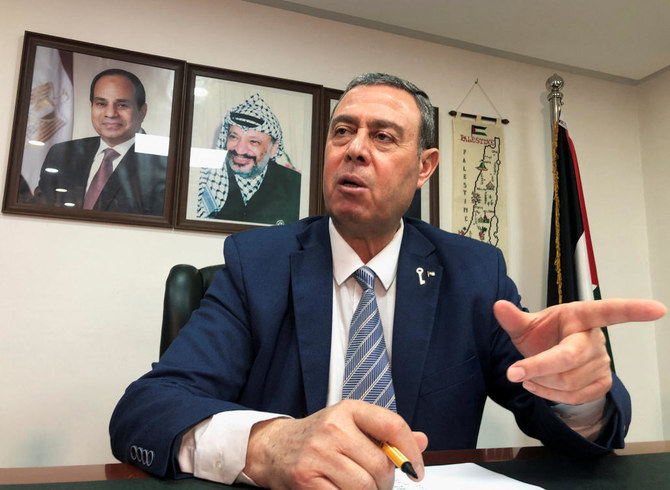
- Diab Al-Louh stressed that residency permits would only be for legal and humanitarian purposes
- Displaced Palestinians in Egypt lack papers to enrol their children in schools, open businesses or bank accounts, travel, or access health insurance
CAIRO: The Palestinian Embassy in Egypt is seeking temporary residency permits for tens of thousands of people who have arrived from Gaza during the war between Israel and Hamas, which it says would ease conditions for them until the conflict is over.
Diab Al-Louh, the Palestinian ambassador in Cairo, said as many as 100,000 Gazans had crossed into Egypt, where they lack the papers to enrol their children in schools, open businesses or bank accounts, travel, or access health insurance — though some have found ways to make a living.
Louh stressed that residency permits would only be for legal and humanitarian purposes, adding that those who arrived since the war began on Oct. 7 had no plans to settle in Egypt.
“We are talking about a category (of people) in an exceptional situation. We asked the state to give them temporary residencies that can be renewed until the crisis in Gaza is over,” Louh told Reuters in an interview.
“We have confidence that our Egyptian brothers will understand this. They have already provided a lot,” he said. “But ... this is an issue of sovereignty being discussed at the highest level.”
Egypt’s State Information Service did not immediately respond to a request for comment.
Egypt has been vocal in its opposition to any mass displacement of Palestinians from Gaza, framing this as part of wider Arab rejection of any repeat of the “Nakba,” or “catastrophe,” when some 700,000 Palestinians fled or were forced from their homes in the war surrounding Israel’s creation in 1948. Palestinian leaders also reject settlement of their people in foreign countries.
During the current war, the Rafah Crossing on the 13-km (8-mile) border between Egypt’s Sinai Peninsula and Gaza has been an entry point for aid deliveries, and has also remained largely open for passenger traffic.
But departures from Gaza, already strictly controlled before the war, have been limited to medical evacuees, foreigners and dual nationals, and Palestinians who pay fees to a company called Hala owned by a prominent Sinai businessman.
‘Things are tough’
Those leaving also need security clearance from Israel and Egypt, which together have upheld a blockade on the enclave since Hamas took power there in 2007.
“We are speaking of 100,000 who are looking forward to the day they can come back to Gaza ... maybe once a truce is reached or the war is ended,” said Louh, a Palestinian Authority official who is himself from Gaza.
“But until this happens, people need to correct their legal status.”
The embassy had already helped facilitate passage for some families to return to Gaza during the war, Louh said. Some Palestinians, including visitors and students enrolled at Egyptian universities, became stranded in Egypt when the war started.
Tens of thousands of Palestinians are thought to have settled after 1948 in Egypt, though numbers were lower than in Jordan, Lebanon and Syria, where the United Nations set up refugee camps. As rules granting Palestinians equal rights to Egyptians were rescinded from around the time of Egypt’s 1978 peace accord with Israel, Palestinians say they experienced increasing difficulties in obtaining documents.
The embassy’s efforts to help Gazans in Egypt have been complicated by a lack of funds and staff. The Palestinian Authority, which has limited autonomy in the occupied West Bank, has been hit by drop in international donor funding and Israel’s withholding of tax revenues it collects on behalf of Palestinians.
“Things are tough, dangerous, and they could become more dangerous,” Louh said, referring to the possibility of a major Israeli incursion into Rafah, where more than a million Gazans have sought shelter near the border with Egypt.
Rebuilding bombed Gaza homes may take 80 years, UN says

- If construction materials are delivered five times as fast as in the last crisis in 2021, re-construction could be done by 2040
- Palestinian data shows that around 80,000 homes have been destroyed
GENEVA: Rebuilding Gaza’s shattered homes will take at least until 2040 but could drag on for many decades, according to a UN report released on Thursday.
Nearly seven months of Israeli bombardment have caused billions of dollars in damage, leaving many of the crowded strip’s high-rise concrete buildings reduced to heaps, with a UN official referring to a “moonscape” of destruction.
Palestinian data shows that about 80,000 homes have been destroyed in a conflict triggered by Hamas fighters’ deadly attacks on southern Israel on Oct. 7. Israeli strikes have killed tens of thousands of Palestinians.
In a best-case scenario in which construction materials are delivered five times as fast as in the last Gaza crisis in 2021, rebuilding destroyed homes could be done by 2040, a building assessment said.
But the UN Development Programme assessment notes that Gaza would need “approximately 80 years to restore all the fully destroyed housing units” under a scenario assuming the pace of reconstruction follows the trend of several previous Gaza conflicts.
A separate report based on satellite images analyzed by the United Nations showed that 85.8 percent of schools in Gaza had suffered some level of damage since Oct. 7. Over 70 percent of schools will require major or full reconstruction, the UN statement added.
The UNDP assessment makes a series of projections on the war’s socioeconomic impact based on the duration of the current conflict, projecting decades of suffering.
“Unprecedented levels of human losses, capital destruction, and the steep rise in poverty in such a short period of time will precipitate a serious development crisis that jeopardizes the future of generations to come,” said UNDP Administrator Achim Steiner in a statement.
In a scenario where the war lasts nine months, poverty is set to increase from 38.8 percent of Gaza’s population at the end of 2023 to 60.7 percent, dragging a large portion of the middle class below the poverty line, the report said.



